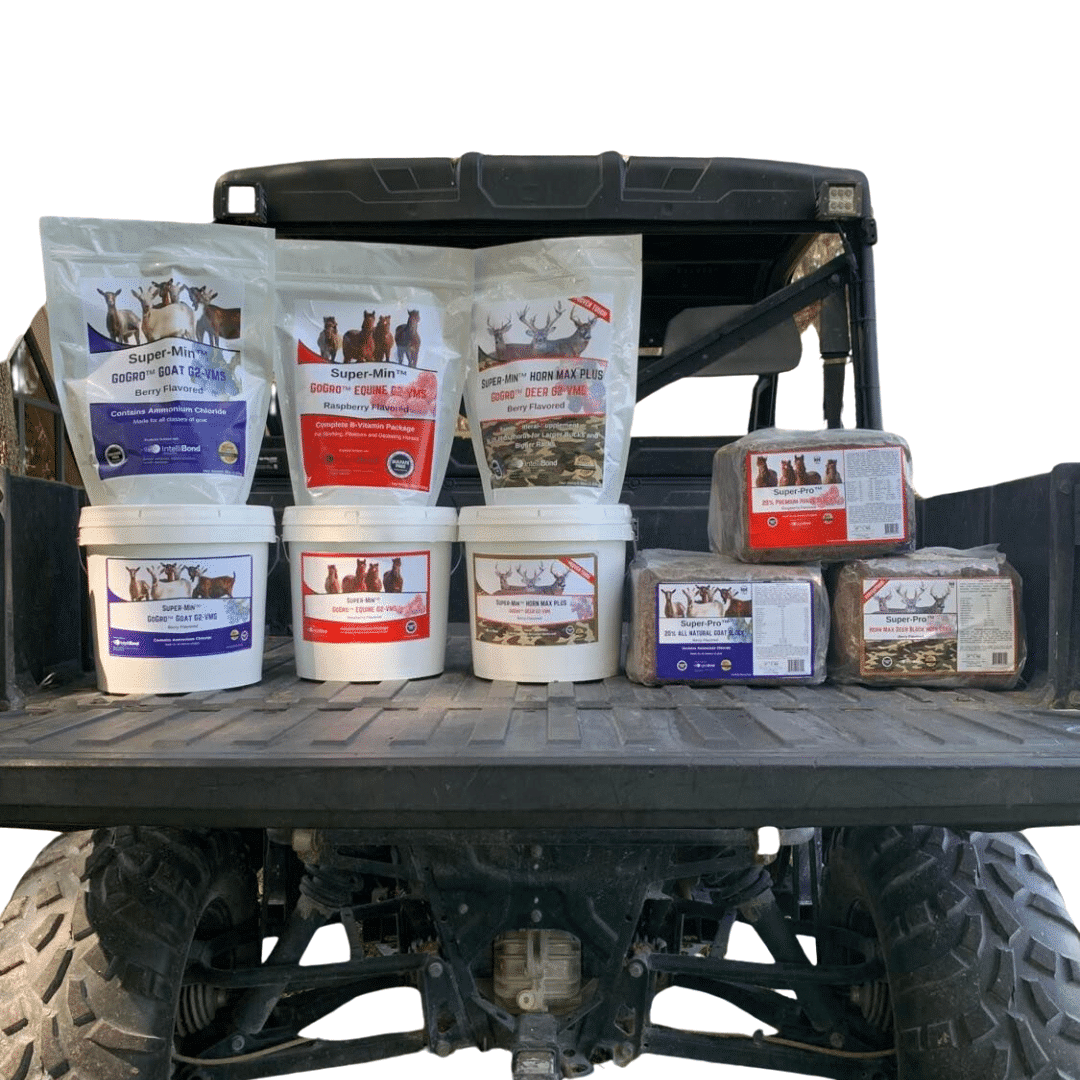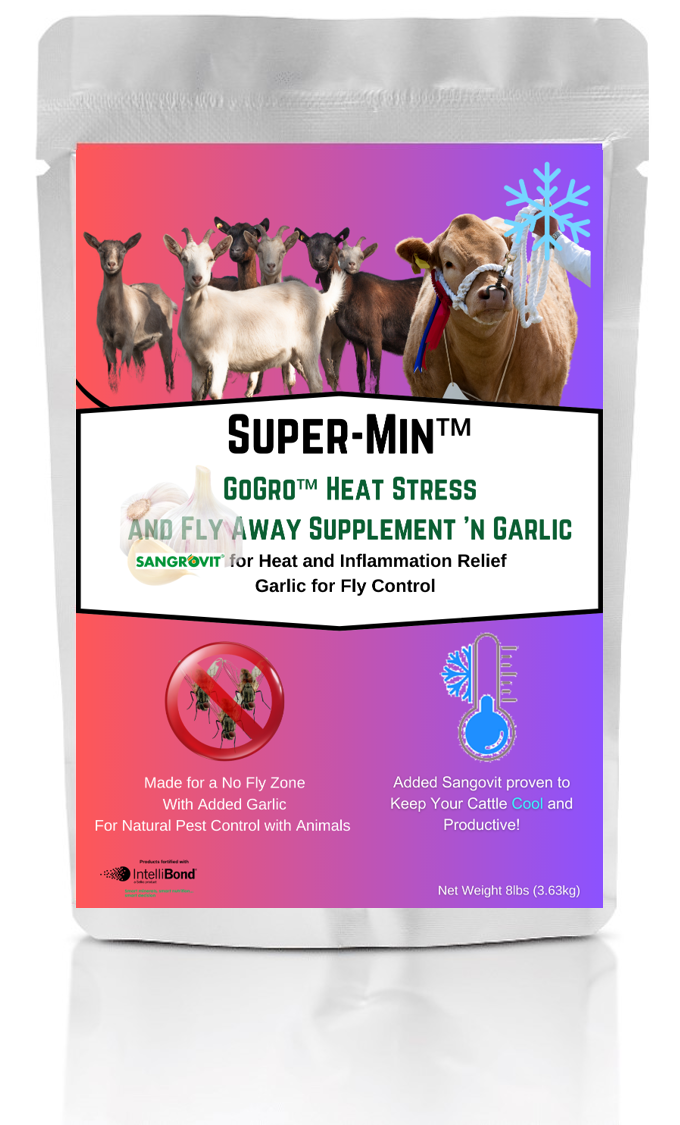
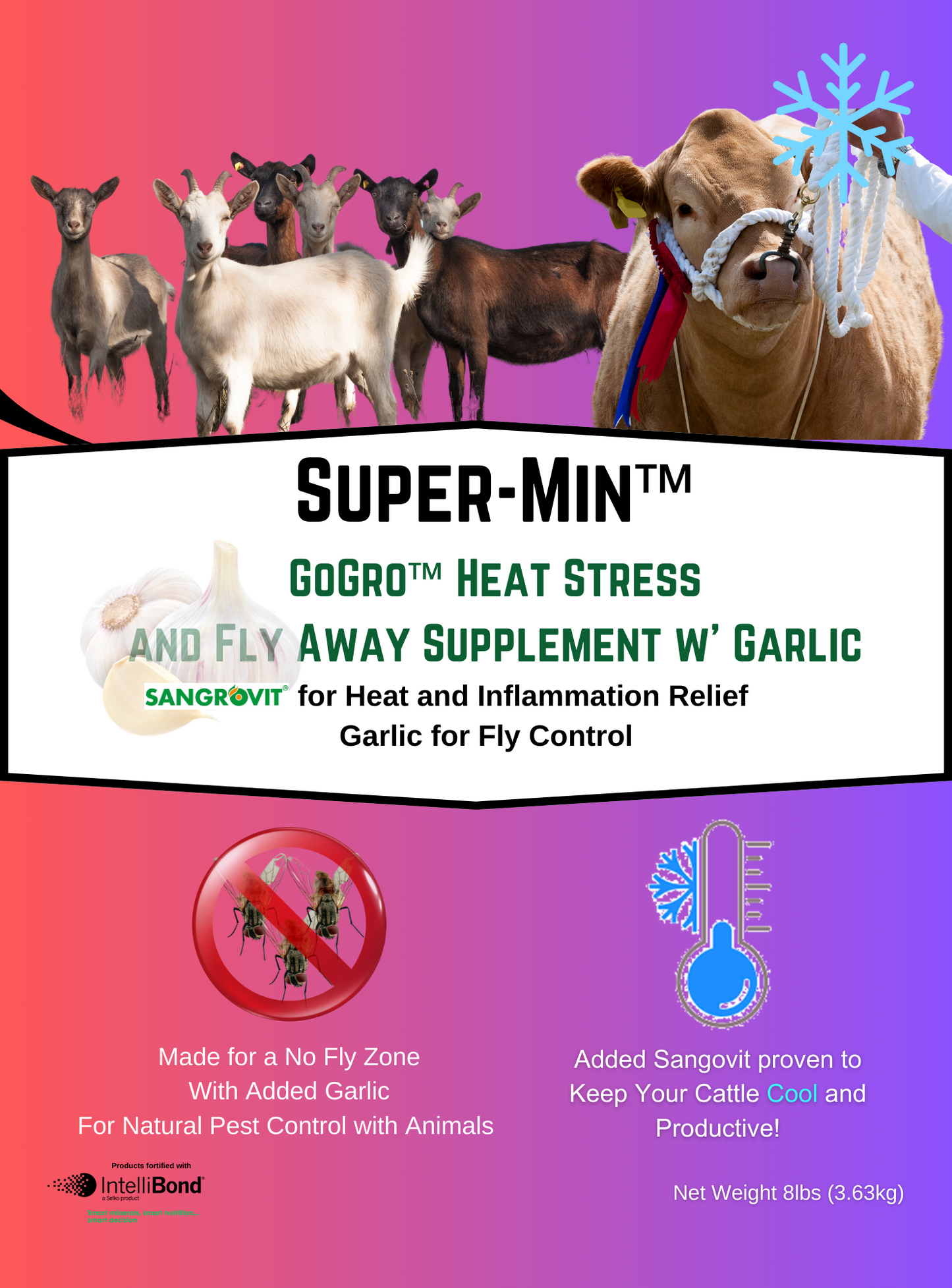
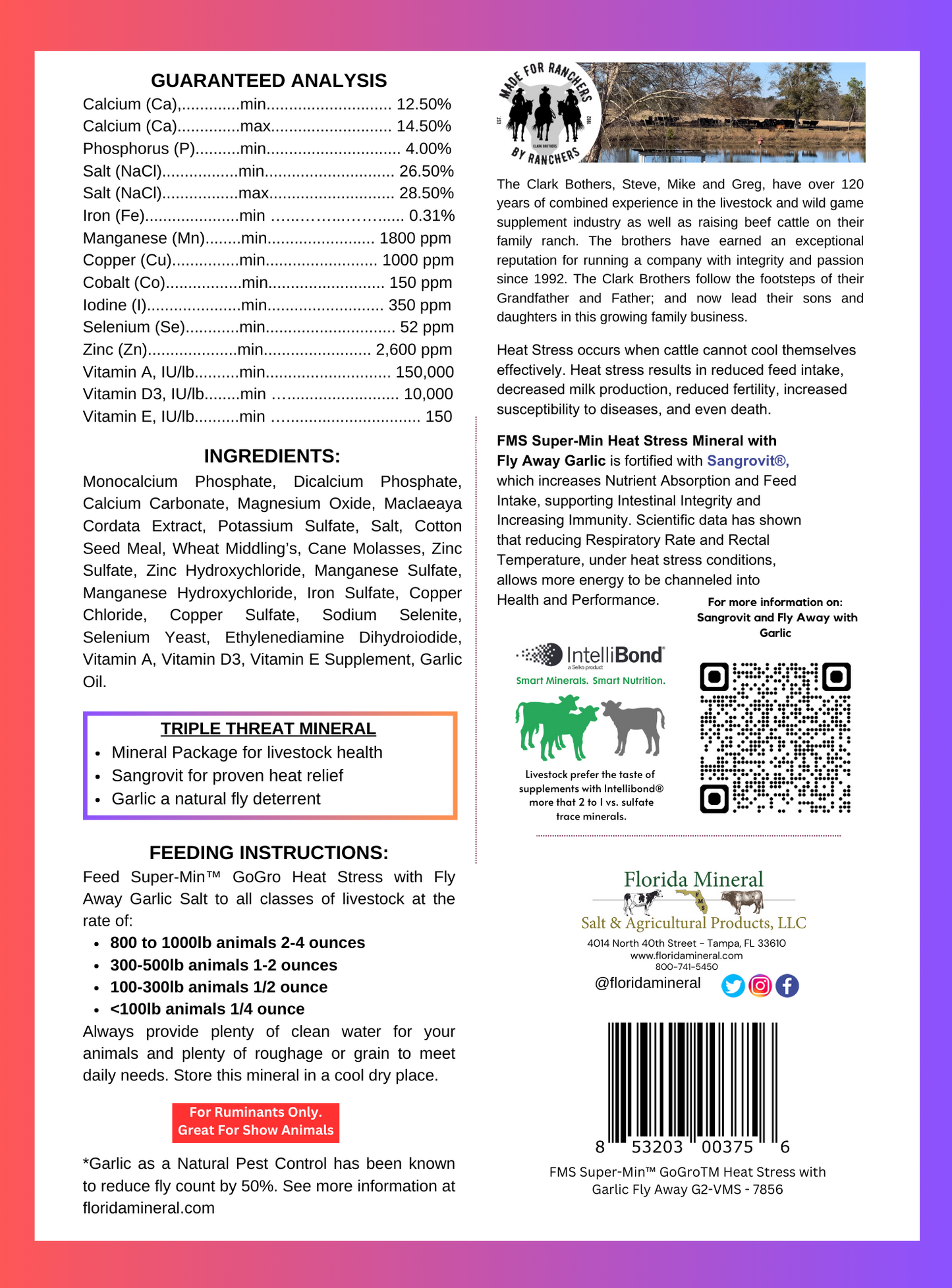
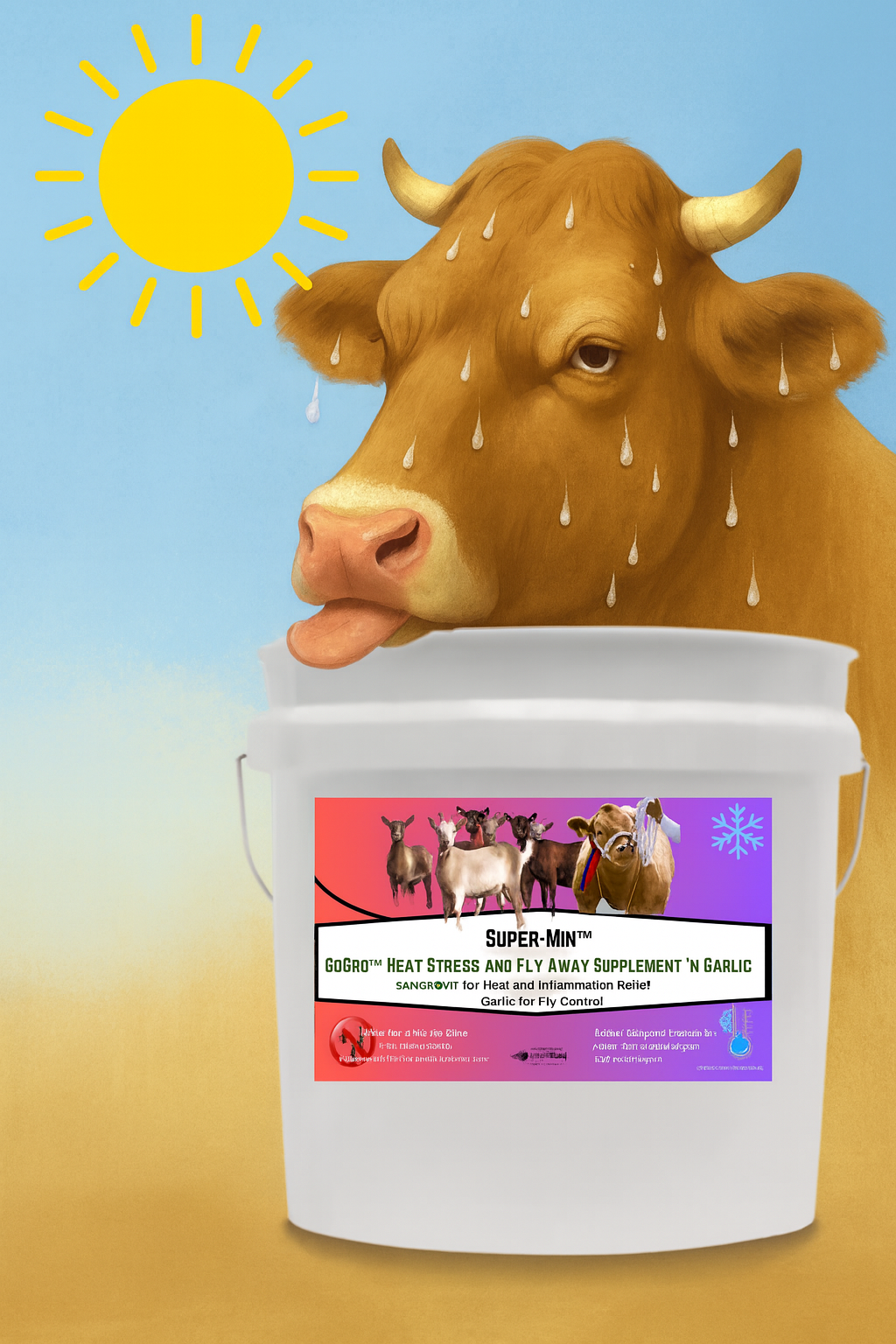
Super-Min™ Heat Stress and FlyAway Supplement w' Garlic (20lb Pail)
8lb Size for Hobby Operations
Key Benefits:
- Sangrovit®: Helps alleviate heat stress and inflammation, supporting overall cattle health.
- Garlic: Natural fly control to enhance comfort and reduce irritation.
Understanding Heat Stress in Cattle
Heat stress occurs when cattle are unable to cool themselves effectively, leading to a range of serious health issues, including reduced feed intake, lower milk production, decreased fertility, and increased vulnerability to disease. In severe cases, it can even result in death.
Super-Min™ Heat Stress Mineral Supplement is enhanced with Sangrovit®, a phytogenic feed additive known for its anti-inflammatory properties. Sangrovit® improves nutrient absorption, increases feed intake, supports gut health, and strengthens immunity. Scientific studies have shown that reducing respiratory rate and rectal temperature under heat stress conditions enables cattle to allocate more energy towards health and performance, rather than combating stress.
Why Cattle are Susceptible to Heat Stress
Cattle are particularly prone to heat stress due to their less efficient cooling mechanisms compared to other animals. Heat stress can affect both dairy and beef cattle, with significant negative impacts on their health, well-being, and productivity.
How Sangrovit® Works
Sangrovit® contains Isoquinoline alkaloids (IQs), a natural extract from Macleaya cordata, with over 20 years of research demonstrating its effectiveness in reducing inflammation and supporting gut health. A study from the University of Melbourne, Australia, found that cattle supplemented with Sangrovit® showed reduced respiration rates and rectal temperatures, allowing energy to be redirected toward health and productivity.
Economic Impact of Heat Stress
The economic consequences of heat stress are significant:
- Reduced Feed Intake: Cattle eat less during heat stress, leading to lower weight gain or even weight loss.
- Decreased Milk Production: Lactating cattle produce less milk, directly impacting income.
- Compromised Reproductive Performance: Heat stress can lead to lower conception rates, increased embryonic mortality, and longer calving intervals, resulting in fewer calves.
- Increased Disease Susceptibility: Heat-stressed cattle are more prone to diseases and health issues, leading to higher veterinary costs and reduced productivity.
- Mortality: Severe heat stress can result in cattle mortality, leading to direct financial losses.
- Lower Meat Quality: Heat stress can reduce carcass quality, affecting market value.
Invest in Your Cattle’s Health
Incorporating Super-Mol™ Tubs and Super-Min™ GoGro™ Mineral into your spring and summer supplementation program is a smart investment. The addition of Sangrovit® for heat stress management will cost an additional 10-20 cents per day per head, amounting to approximately $15-30 per head over a 5-month heat season. This investment can significantly mitigate the negative impacts of heat stress, protecting your cattle and your bottom line.
Comprehensive Heat Stress Management
In addition to nutritional interventions, implementing management strategies such as providing shade, ensuring access to clean, cool water, and using sprinkler systems or fans can further alleviate heat stress. Proper mineral supplementation plays a crucial role in maintaining electrolyte balance, supporting thermoregulation, and enhancing overall health and productivity.
Heat Stress Mineral Benefits:
- Electrolyte Balance: Replenishes essential minerals lost through sweating.
- Temperature Regulation: Supports normal bodily functions to help regulate body temperature.
- Improved Water Intake: Encourages hydration, preventing dehydration.
- Enhanced Immune Function: Bolsters immunity, reducing disease susceptibility.
- Reproductive Support: Aids in conception, fetal development, and sperm production.
- Improved Heat Tolerance: Certain minerals may enhance cattle’s ability to withstand heat stress.
- Overall Health and Performance: Maintains optimal performance even under stressful conditions.
Customized Supplementation
Specific mineral requirements vary depending on factors such as breed, age, and environmental conditions. Consult with a veterinarian or animal nutritionist to determine the appropriate heat stress mineral supplementation for your cattle.
And Don't Forget the Fly Away Garlic
Garlic is often suggested as a natural deterrent for flies and other insects that bother livestock. Garlic contains a compound called allicin, which is believed to have insect-repellent properties. When consumed, the odor from garlic can be excreted through the skin, sweat, and breath, creating a scent that some insects, including flies, find unpleasant. Allicin is a compound that is found in garlic (Allium sativum). It is responsible for the distinct aroma and flavor of garlic. When garlic is crushed, chopped, or otherwise damaged, an enzyme called alliinase converts a precursor compound called alliin into allicin. Allicin is volatile and quickly decomposes into other compounds, which is why the pungent smell of garlic dissipates over time. While some farmers and ranchers claim that garlic has helped reduce fly populations around their cattle, there is no consensus in the scientific community regarding its effectiveness. Flies can be a nuisance to livestock and can potentially transmit diseases, so it’s crucial to implement reliable fly control measures. Below are links to studies supporting garlic as a natural fly control product.
It’s important to consider that relying solely on garlic as a fly deterrent may not provide complete control over fly populations. Implementing comprehensive fly control strategies, such as good sanitation practices, proper manure management, fly traps, and insecticides approved for livestock use, may be necessary for more effective fly control.
Click on the links below to learn more about the power of Garlic.
Canadian Garlic Study- ~50% Fly Reduction
2023 Study on Garlic as a Fly Control
